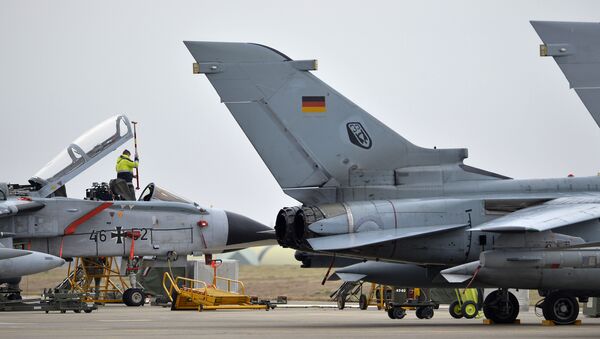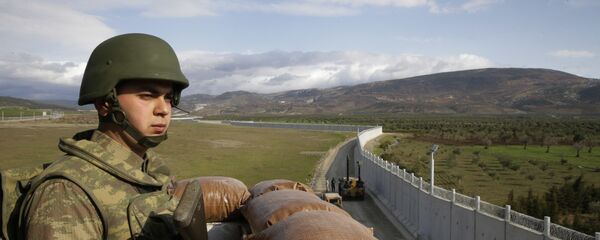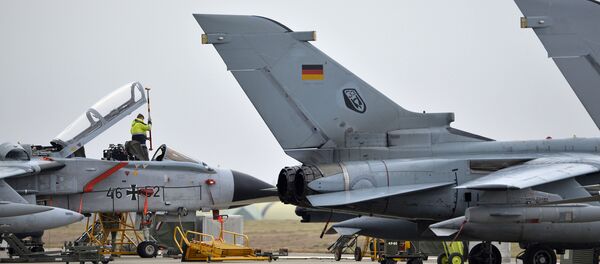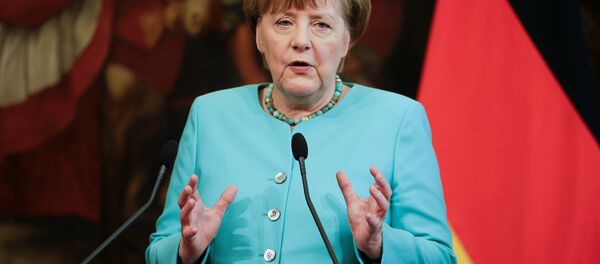The German cabinet is due to approve the decision on Wednesday, after a meeting between Foreign Minister Sigmar Gabriel and his Turkish counterpart Mevlet Cavosuglu failed to find a resolution to the dispute.
"Turkey has made clear that, for domestic reasons, it cannot approve visits of all lawmakers. I regret that, but Turkey must understand that for domestic political reasons, we must transfer German soldiers out of Incirlik," Gabriel told a press briefing on Monday.
Cavosuglu told the press conference that German lawmakers are allowed to visit the NATO base at Konya, but still can't go to Incirlik, which is mainly used by the Turkish and US air forces.
"At the moment, there aren't the conditions for a visit to Incirlik," the Turkish Foreign Minister said.
Prior to the crisis talks, Cavosuglu had called Germany's approach to relations with Turkey "troubling," and said Ankara might reconsider its ban on visitation if Berlin changes its stance.
"It is not possible to open the Incirlik base for a visit, but we might reconsider the decision in the future if we see 'positive steps' from Germany," Cavosuglu said, the Daily Sabah reported.
The conflict over German access to the base re-ignited last month after a group of German lawmakers were refused permission to visit troops at Incirlik, which is home to some 260 German soldiers as well as Tornado jets and aircraft tankers.
German Bundestag deputies attempted to visit soldiers at Incirlik on May 15, but were refused permission. Ankara's refusal was retaliation at Germany's decision in early May to grant asylum to 414 Turkish soldiers, diplomats, judges and government employees who sought refuge in Germany following last July's failed military coup.
It is the second time that the Turkish government has punished Germany by refusing access to Incirlik, following an incident in June 2016 when Bundestag deputies were denied entry after they passed a resolution recognizing the 1915 Armenian Genocide.
In the aftermath of the latest aborted visit, Defense Minister Ursula von der Leyen visited Jordan's Al Azraq air base, and commented on her "positive" impression about the base as an alternative to Incirlik.
On Monday, von der Leyen said that the Bundeswehr has received approval about the transfer from King Abdullah of Jordan and is "ready" to move troops and around 10,000 tons of equipment.
"Of course, this means a pause in our flight missions in the fight against Daesh," the Minister said, adding that the tankers should be ready to fly again in two to three weeks, and the Tornados in two to three months.
According to the German news website Heise, the €58 million has already been disbursed to the Turkish government and Turkish construction companies, which contributed to Berlin's reluctance to leave the base.
Nevertheless, there is cross-party support for the decision to leave Incirlik.
"This is not a decision against Turkey, this is rather more a decision for our constitution and our soldiers," SPD party chairman in the Bundestag, Thomass Opperman, said last week.
"I regret Turkey's decision, especially since it contradicts NATO values. The Federal Government cannot allow the Turkish attitude to deprive it of its rights. The transfer from Incirlik is therefore logical," CDU chairman in the Bundestag Franz Josef Jung stated on Monday.
On Monday, Gabriel told Germany's Tagesthemen television news program that the Incirlik issue is dwarfed by even bigger problems in the relationship between Berlin and Ankara, which is in a "difficult phase."
"Incirlik is rather one of the smaller problems we have at the moment," Gabriel said.
"Parliament must have the opportunity to visit the army without there being a great fuss – and if that does not happen, we have to leave."
German commentator Severin Wieland called the impending departure from Incirlik "the right signal."
"What is routine elsewhere – the visit of German deputies to the Bundeswehr – has become so politically charged by Ankara in recent months that there is no other way out," Wieland wrote in Spiegel Online.
"In the end, this was also about the self-esteem of the German parliament, which makes decisions about the deployment of its army and therefore also has to get information on the ground about how German soldiers are used abroad. If the German government had not withdrawn the Luftwaffe unit and Tornadoes, it would be an embarrassment to the concept of the Bundeswehr as a parliamentary army."






